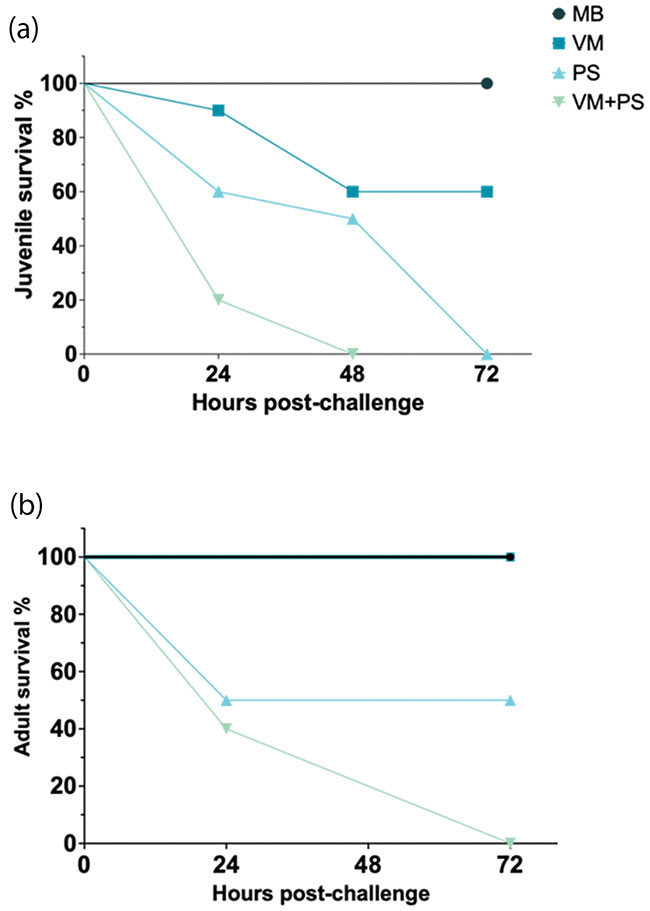
News & Views
Disease Management
Research
Cause of massive summer mortality in New Zealand’s Greenshell mussels identified
December 18, 2023 By Ruby Gonzalez
 Survival plots of juvenile (a) and adult (b) mussels after a 72 h post challenge to marine broth (MB), V. mediterranei (VM), P. swingsii (PS), and coinfection of both VM and PS (VM + PS). Photo: Journal of World Aquaculture Society
Survival plots of juvenile (a) and adult (b) mussels after a 72 h post challenge to marine broth (MB), V. mediterranei (VM), P. swingsii (PS), and coinfection of both VM and PS (VM + PS). Photo: Journal of World Aquaculture Society Coinfections by pathogens, Photobacterium swingsii and Vibrio mediterranei, cause high mortality in New Zealand’s Greenshell (Perna canaliculus), according to a New Zealand study.
In the experiments, juvenile and adult injected with both pathogens resulted in zero survival. Juvenile died at the fastest rate, with nil survival at 48 hours post-challenge (hpc). Adult had 40 per cent survival after 24 hours and nil survival at 72 hpc.
Compared to adult, these results show that juvenile are more susceptible to coinfections than adult mussels.
“This susceptibility can be attributed to the fact that smaller mussels have a lower tolerance to pathogens, since juveniles may not have fully developed immune systems,” cited Azizan et al. in “Investigating the effect of bacterial coinfections on juvenile and adult green-lipped mussels (Perna canaliculus).”
The study was able to demonstrate the juvenile’s susceptibility to pathogenic infections by focusing on the animal’s different sizes and life stages.
Findings provide valuable insights into the immune system of mussels, their susceptibility/resilience to pathogenic infections, and potential mechanisms of infection progression for this valuable mussel species. The study is the first to explore the mechanisms of pathogen coinfection in Greenshell mussels and support efforts to strengthen biosecurity management in New Zealand. It is part of a larger research program focused on the investigation of mussel summer mortality in New Zealand.
Summer months cause increased seawater temperatures, which act as a stressor on mussels, it was explained. The essential biological process was affected, including metabolism, reproduction growth, behaviour, immune system and survival. The higher temperatures likewise create favorable factors for bacteria in marine environment.
V. mediterranei has previously been identified as a dominant bacterium in ailing and dying giant fan mussels (Pinna nobilis) during mass mortality events. P. swingsii is known to be pathogenic in oysters.
Greenshell mussel is endemic to the New Zealand and the country’s top seafood export.
Print this page
Advertisement
- eFishery announces completion of commercial pilot in India
- Chamber of Aquaculture Ghana appeals for support after devastating dam spillage





